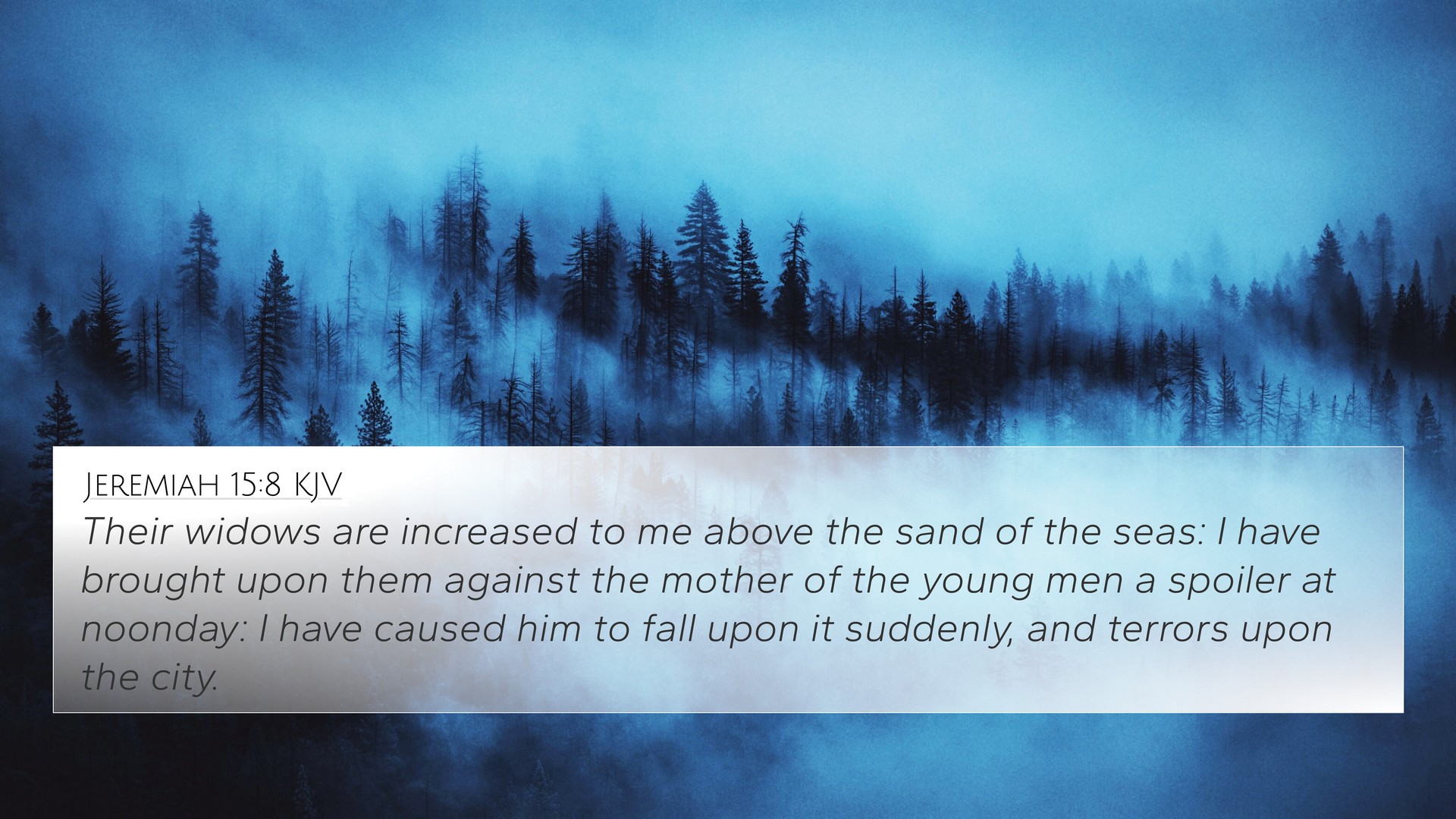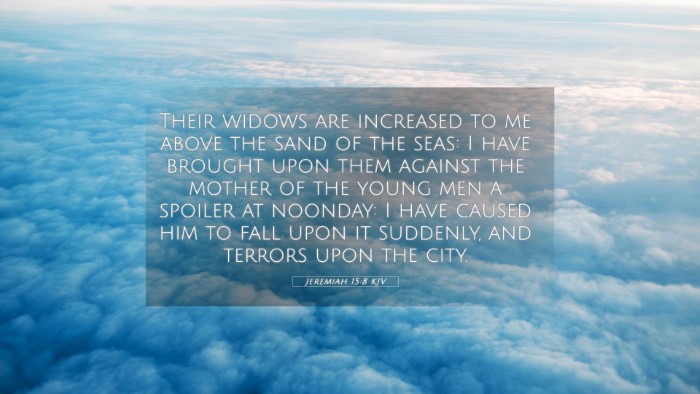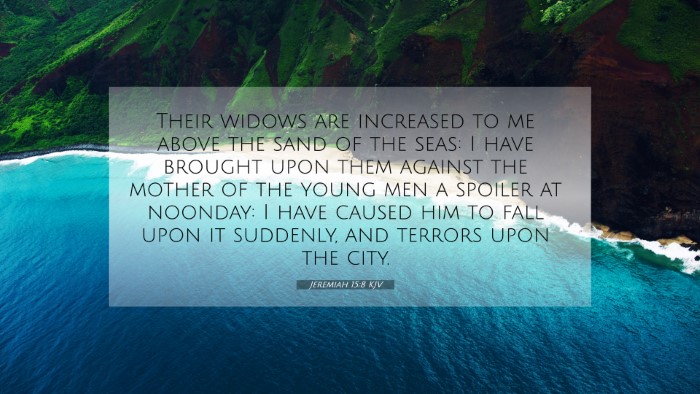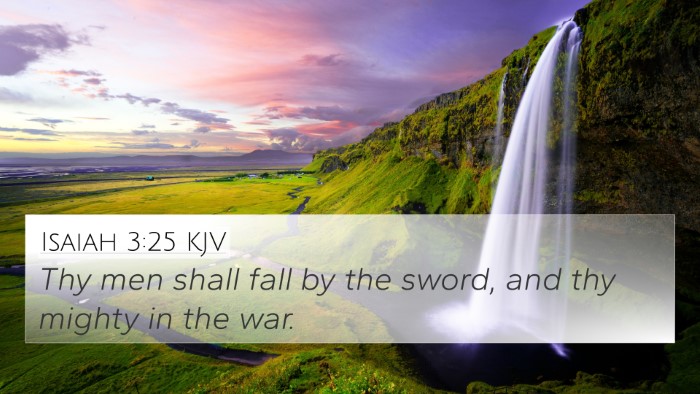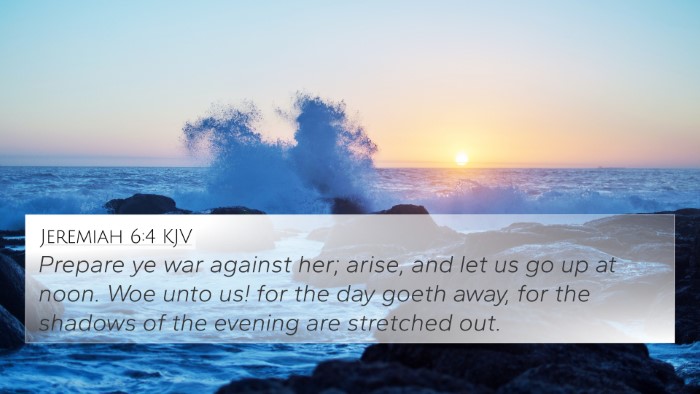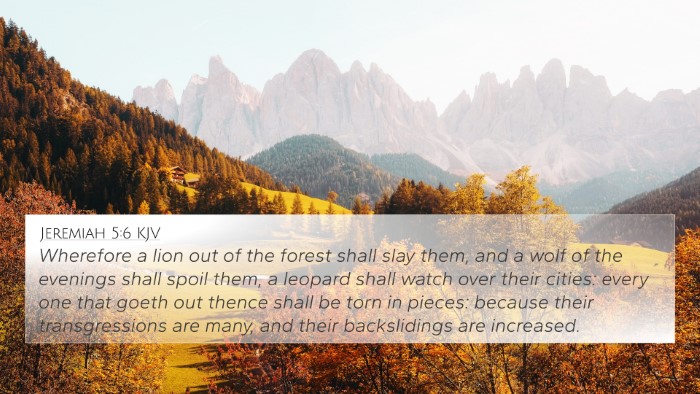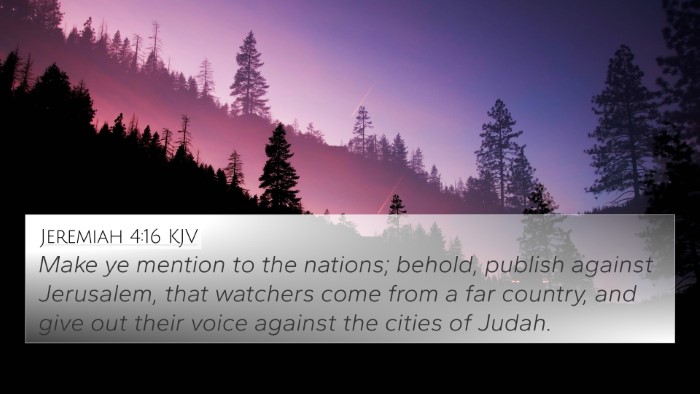Understanding Jeremiah 15:8
Jeremiah 15:8 states: "Their widows are increased to me above the sand of the seas: I have brought upon them against the mother of the young men a spoiler at noonday: I have caused them to fall upon it suddenly and terrors upon the city." This verse articulates the deep sorrow and lamenting of the prophet Jeremiah regarding the destruction and desolation faced by his people.
Summary of Meaning
This verse highlights a few key themes:
- The Weight of Grief: Jeremiah uses vivid imagery to express the overwhelming grief that has befallen his nation, particularly focusing on the plight of widows.
- God’s Judgment: It reflects God's sovereign action in executing judgment upon the people, emphasizing the seriousness of their sin and rebellion against Him.
- The Reality of Loss: The mention of “widows” signifies loss and the fragility of life resulting from conflict and divine retribution.
Insights from Commentaries
Combining insights from public domain commentaries, we see several layers of understanding:
-
Matthew Henry: Henry emphasizes the metaphorical language used to convey the depth of Israel's suffering while underscoring God's justice. He contextualizes this within the reality of God's eternal moral order, suggesting that while God is merciful, His judgment is equally assured.
-
Albert Barnes: Barnes elaborates on the emotional turmoil reflected in this verse, pointing out that it conveys the magnitude of divine judgment. He also connects Jeremiah's lament to the broader narrative of the destruction of Jerusalem, emphasizing the consequences of disobedience to God.
-
Adam Clarke: Clarke discusses the socio-economic implications of the destruction mentioned here, explaining the significance of widows in ancient Israelite society, and how their increased number is a testament to the widespread calamity that befalls the nation.
Cross-References and Related Scriptures
Jeremiah 15:8 is intricately connected to several other Bible verses which can enhance our understanding through cross-referencing:
- Jeremiah 9:17-19: This passage highlights the mourning of the widows and the desolation of the land.
- Lamentations 1:1-2: It depicts Jerusalem as a widow, paralleling the grief expressed in Jeremiah 15:8.
- Isaiah 54:1: A contrast to the widow's despair, introducing themes of restoration and hope.
- Matthew 23:37: Jesus laments over Jerusalem, reflecting the historical and ongoing emotional ties to the city’s fate.
- Ezekiel 24:16-18: A parallel account that addresses the sorrows related to the fall of the nation.
- Luke 18:7: The persistence of the widow in prayer, contrasting themes of loss and faithfulness.
- James 1:27: Discussion on taking care of orphans and widows, bringing a New Testament perspective to the plight highlighted in Jeremiah.
Thematic Connections
The themes in Jeremiah 15:8 resonate throughout scripture, linking various experiences of loss, divine judgment, and the hope for redemption. The importance of cross-referencing other Scripture is crucial, as it offers a holistic view of Biblical truths:
-
Divine Justice: Illustrated in verses like Romans 2:6, which emphasizes the inevitability of God's judgment based on deeds.
-
The Plight of Widows: The consistent mention of widows in scripture reflects God's compassionate care for the vulnerable, a theme that recurs from Exodus 22:22-24 to 1 Timothy 5:3-5.
-
Universal Grief: Connections to Revelation 21:4 offer hope amid sorrow, a thematic counterpoint to Jeremiah’s grief.
Tools for Cross-Referencing
To deepen understanding and facilitate studies on verses such as Jeremiah 15:8, various tools can help:
- Bible Concordance: A useful resource for locating related verses efficiently.
- Bible Cross-Reference Guide: Guides that map connections across different books of the Bible.
- Cross-Reference Bible Study Methods: Techniques to analyze scripture contextually through links between verses.
Conclusion
Jeremiah 15:8 offers significant insight into the suffering experienced by God’s people and the divine justice that accompanies such suffering. By engaging with various biblical texts through a system of cross-referencing and thematic exploration, readers can cultivate a richer understanding of scripture, enhancing both personal faith and communal dialogue.
